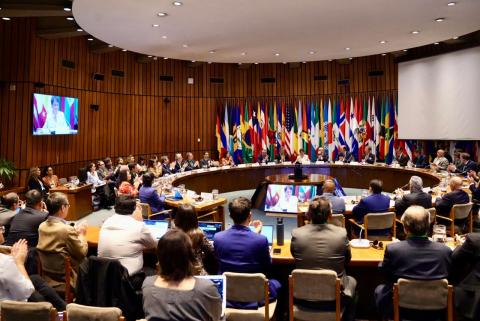Press Release
A large proportion of regional exports (of natural resources, maquila goods and perishable products, for example) are highly sensitive to logistics costs or delivery delays, since variations in transportation costs, infrastructure shortages or deficient facilitation can leave them out of the market. Therefore, it is essential to coordinate logistics and mobility policies, ECLAC says in a new report.
In the document Logistics and Mobility Policies for Sustainable Development and Regional Integration (in Spanish only), the United Nations regional commission provides a general framework for the formulation of national logistics and mobility policies with common standards for Latin American and Caribbean countries, with the medium-term aim of converging in regional policies that have all the advantages of full and sustainable integration.
According to ECLAC, although the major value chains of companies with local or foreign capital use an integrated management approach to control the entire logistics chain and achieve high levels of efficiency, there are also small producers and business owners that lack the necessary scale and training to administrate their logistics in an efficient manner.
ECLAC and other multinational and national organizations identify many traditional and emerging challenges as being linked to logistics and mobility and their relationship with economic development. In addition, the discussion on the Sustainable Development Goals—recently approved by the UN Member States—shows the existence of a virtuous link between good logistical performance, efficient mobility services and sustainable development. “To improve this, proper coordination and articulation of public and private actions are needed, which the traditional way of doing politics and regulating services has not been able to resolve adequately,” the publication states.
The document is based on the results of nine national workshops on logistics and mobility policies held in Chile, Colombia, Costa Rica, El Salvador, Guatemala, Haiti, Honduras, Nicaragua and Panama. Additional similar workshops are scheduled for 2016 in Belize, the Dominican Republic, Mexico and Peru, as well as other Caribbean countries.
According to ECLAC, a central aspect lies in strengthening the national and regional institutional architecture, both in the technical sphere—which is to say in methodologies and the rigor of evaluations of logistics and mobility policies—and the political sphere, particularly in the formulation of projects and the coordination and participation in decision-making. Only in this way will it be possible to advance progressively from physical integration towards a more effective productive and logistical integration.
The document adds that the benefits in terms of competitiveness and well-being that are obtained through harmonized planning of infrastructure and the coordination of logistics and mobility services destined to a regional market are greater than the benefits that could be achieved individually.


